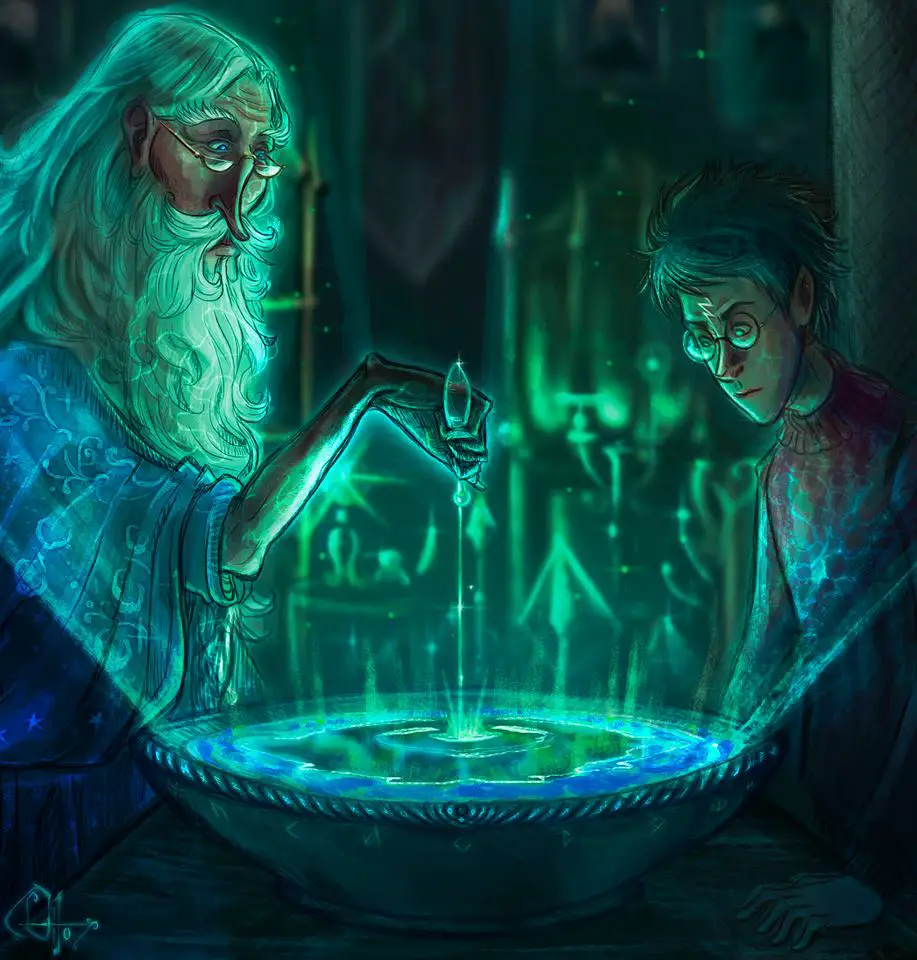
TW: Mental illness and childhood neglect
From the moment I started reading Harry Potter, and especially visualizing his character in the movies, I had a theory that Voldemort (or Tom Riddle) was not quite normal. There were behaviors he had that pointed to specific psychological disorders that I learned about in my Abnormal Psychology class. Although I am not a licensed clinical psychologist that is able to diagnose psychological disorders, I believe there are certain criteria that Voldemort meets for a specific disorder called Antisocial Personality Disorder.
General personality disorders involve “problems in thinking, affect, impulse control, and interpersonal functioning that persist for years and influence many domains of life” (Abnormal Psychology class, Spring 2021). They are divided into 3 clusters: A, B, and C. Antisocial Personality Disorder falls in the Cluster B category, describing “dramatic, emotional, or erratic behavior”, which I think that Voldemort definitely has, as many would agree.

Firstly, there are common risk factors for these personality disorders. They include environmental factors and genetic factors. I want to focus more so on the nurture side of this argument, as it relates more to Voldemort’s childhood. Thus, one environmental factor that may result in a higher risk for personality disorders is if the individual experienced childhood abuse and neglect. This was something that was discovered in Half-Blood Prince by Dumbledore and Harry. During his lessons with Dumbledore, Harry entered the Pensieve – a magical object used to enter memories of another – and learned about Voldemort’s past. Most importantly, Harry learned that Voldemort’s mother died at childbirth. As a result, Voldemort ended up living in an orphanage as a young boy. His father, Tom Riddle, who was under a charm casted by Voldemort’s mother, abandoned her while she was pregnant after breaking free from that charm. Thus, in this example, it is evident that Voldemort was neglected as a baby, potentially giving him a higher likelihood of developing a personality disorder.
Antisocial personality disorder (APD) is defined as a “pervasive pattern of disregard for the rights of others” (Abnormal Psychology class, Spring 2021). The DSM-5 criteria are as follows (DSM-5):
- At least 18 years of age
- Evidence of conduct disorder before age 15
- Pervasive pattern of disregard for the rights of others since the age of 15 as shown by at least 3 of the following:
- Repeated law breaking
- Deceitfulness, lying
- Impulsivity
- Irritability and aggressiveness
- Reckless disregard for own safety and that of others
- Irresponsibility as seen in unreliable employment or financial history
- Lack of remorse
It seems that Voldemort checks most, if not all, of these boxes. Let’s go through each one and connect them to his behavior throughout the years, as described in Half-Blood Prince.
Although Voldemort was not 18 years of age when he started committing notorious and horrific crimes, there was clear evidence of conduct disorder that was documented when he was living in the orphanage as a young boy. Mrs. Cole, a woman from Tom’s orphanage, describes him to be “odd” and a “bully” (Half Blood Prince, 195). She described an instance where young Tom Riddle was accused of murdering Billy Stubbs’s rabbit, although “Tom said he didn’t do it” (Half Blood Prince, 195). Additionally, she describes an altercation that young Tom Riddle had with other children from the orphanage when he led them into a cave. She told Dumbledore, during their meeting, that the children “were never quite right afterwards” (195). Provided here, it is evident that Tom, no older than 11 years old at the time, often got himself in trouble with the orphanage and enjoyed hurting other children and animals. Additionally, he checks the second criteria on our list – deceitfulness and lying – as he often lied himself out of trouble, and as nobody knew about magic, he was able to get away with it.
Moreover, Voldemort often broke the law (MANY times). He murdered his own father and his grandparents, as a means of revenge for abandoning him and his mother. Additionally, he murdered a woman named Hepzibah, to obtain her treasures – Helga Hufflepuff’s badger and Salazar Slytherin’s locket. These are only two of the many murders that he has committed throughout the years. What is especially interesting about these murders is that Voldemort was able to get away so easily, often using Memory Charms on others around the crime scene to take the fall for him, including a House elf and his own uncle. Here again, we see his clear deceitfulness and lying. We also see how he quickly acts on impulse (number 3 on the criteria list). He didn’t think twice about murdering Hepzibah once he found out that she had two possessions that he so badly wanted. As for many of the murders he’s committed, he sometimes acts on pure anger towards his own followers.
As is quite evident in the Harry Potter books, Voldemort is a very irritable and aggressive character. He does not take no for an answer and punishes those who fail to bring him what he wants. Many of his own Deatheaters are terrified of doing him wrong for that very reason. Additionally, he shares a strong dislike for anything that connects him to other people, especially his father, Tom Riddle. By changing his name to Lord Voldemort, he was able to free himself of his Muggle father’s name.
The fifth criteria is supported by Voldemort’s practice of the Dark Arts throughout his final years at Hogwarts and thereafter. Voldemort tells Dumbledore during their meeting in Half-Blood Prince that he has “pushed the boundaries of magic further, perhaps, than they have ever been pushed…” by which Dumbledore argues is “woefully ignorant” (Half-Blood Prince, 314). Thus, it seems that during his rise to power, Voldemort put his own soul (and life) at risk, while also sacrificing others to get what he wants. This is most evident in his quest to obtain seven Horcruxes, to essentially make him immortal, and therefore, untouchable.

The sixth criteria is quite interesting, as one would question how a person like Voldemort would be able to obtain employment. But so he did, at Borgin and Burkes, as an assistant. However, after obtaining the two possessions from Hepzibah, mentioned earlier, he disappeared and never returned back there to work again. It seemed he only worked there to get something out of it.
Lastly, and probably the most important, Voldemort had a lack of remorse for his crimes and murders. After arriving at Hogwarts at 11 years old, Voldemort was liked by the staff there and was viewed as “polite, quiet, and thirsty for knowledge” (Half-Blood Prince, 259). Harry asked Dumbledore why he had not warned the other staff of his past behavior, in which Dumbledore replied with “though he had shown no hint of remorse, it was possible that he felt sorry for how he had behaved before…” (259). In addition, Voldemort lacked affection towards anyone, including his own supporters, who he often just used to carry out his tasks, with no consideration for the risk they were taking.
So, what do you think? Does Voldemort have APD? Does my analysis convince you that he may have suffered from this mental illness? Could he have been helped by a psychologist when he was a young boy? Did Hogwarts do him more damage than good?
Thank you again for reading my post! 🙂
2 responses to “An attempt at a psychological analysis of Voldemort: Does he have Antisocial Personality Disorder (APD)?”
This has been one of the more interesting blog posts I have read so far. Your ability to connect your psychological knowledge with the series is uncanny and I really enjoy reading your analysis. After reading this post I think it is clear that Voldemort may have APD. He displays all the characteristics of a person with this disorder, at least according to the blog. I really enjoyed how you broke this down and made it simple for the reader to follow. This post was really informative and I have, again, learned something new from you. Thank you!
Hey Britney!
I absolutely loved how you approached this subject firstly with the trigger warnings and explaining thoroughly what APD is and the common environmental influences. I really like how you incorporated many examples throughout the book to show Voldemort having these symptoms as well and it made for a pretty convincing claim! As for the questions at the end, it’s compelling to say Voldemort does have APD but I hesitate to say because it’s a spectrum and is easily vilified by the media when in actuality, individuals with APD are generally harmless and are in a multitude of fields (the most popular being the medical and business fields). Additionally, I am not a certified and experienced psychiatrist so I choose not to diagnose. I do think that Voldemort could’ve been helped by a psychiatrist or another positive/comforting influence when he was a young boy as things may have gone a lot differently if he did receive help. Since Hogwarts is already separated by groups and doesn’t nurture the most encouraging environment (especially with Umbridge around), I don’t think it would’ve done him any good either.
Great Job!